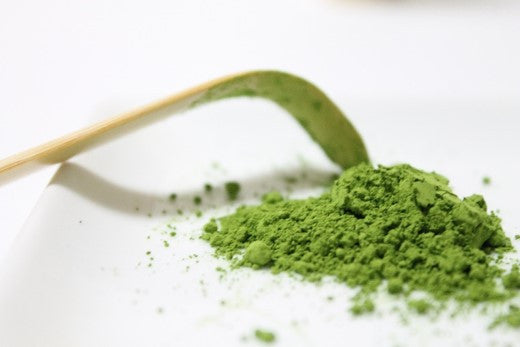Grinding Japanese Matcha Green Tea Powder
One of the most important elements of Japanese Matcha powder production is the grinding process. Even though high powered heat generating grinders are able to produce amazing quantities in a short amount of time, the traditional Japanese way of grinding with granite stone mill is still, till today, the best method to handle these high quality and delicate leaves.

About the process
Before learning about the grinding process, we must understand what leaves we are grinding. Matcha powder is made from the same plant as other green teas, black teas and even oolong teas. The only difference is a special process done several weeks prior to harvesting. Learn more about Matcha harvesting here.

After these leaves are dried, they go through another tedious process to remove the veins and stems. These leaves, usually referred to as Tencha leaves, are now ready for grinding.

Traditional Japanese granite stone mill
Made of stone, these granite stone mill are able to grind the Tencha leaves into very fine powder. Each granite stone mill can only produce up to 25g – 30g of premium Matcha powder every hour, that’s about the size of ONE packet of our Organic Matcha Superior Green Tea Powder 1.1 oz (30g). Grinding these Tencha leaves the proper way, slow as it may be, can preserve the color and flavor of these leaves.

Machine grinders VS Traditional Japanese granite stone mill
Japanese folk traditions, as interesting as it may be, is it really necessary to follow these steps to produce Matcha powder?
Sadly or gladly, the answer is YES!
After going through the tedious process of obtaining Tencha leaves, ruining them in the grinding process will be nothing short of a disaster. High powered grinders, or machine grinders, are able to produce high quantities in a short time but, they will generate a significant amount of heat in the process. This heat will cause the Matcha powder to lose some of it's natural aroma in the process. On the other hand, traditional Japanese granite stone mills goes through a rather slow process of grinding the Tencha leaves without burning them out, producing high quality Matcha powder that retains it's nutrients, along with it's incomparable aroma and flavor.
Hope you enjoyed this article.
If you will like to try this amazing Japanese Matcha powder, click here.
If there are any questions please feel free to ask anytime. Thank you!

